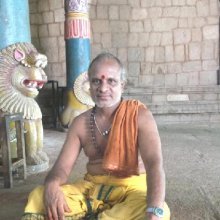Dhanurbana, Dhanurbāṇa, Dhanur-bana: 1 definition
Introduction:
Dhanurbana means something in Hinduism, Sanskrit. If you want to know the exact meaning, history, etymology or English translation of this term then check out the descriptions on this page. Add your comment or reference to a book if you want to contribute to this summary article.
Images (photo gallery)
In Hinduism
Purana and Itihasa (epic history)
Source: archive.org: Shiva Purana - English TranslationDhanurbāṇa (धनुर्बाण) refers to “(possessing) bows and arrows”, according to the Śivapurāṇa 2.5.6 (“Prayer to Śiva”).—Accordingly, as Śiva said to Brahmā: “O Brahmā, if I am to be proclaimed the emperor of the gods, I do not have the paraphernalia characteristic of my lordship. I do not have a divine chariot and a divine charioteer. I do not possess bows and arrows (dhanurbāṇa) which accord victory in a battle [dhanurbāṇādikaṃ cāpi saṃgrāme jayakārakam]. If there had been a chariot I could have sat in it and with bow and arrows I could have killed even powerful Asuras, with a resolute determination”.

The Purana (पुराण, purāṇas) refers to Sanskrit literature preserving ancient India’s vast cultural history, including historical legends, religious ceremonies, various arts and sciences. The eighteen mahapuranas total over 400,000 shlokas (metrical couplets) and date to at least several centuries BCE.
See also (Relevant definitions)
Partial matches: Dhanus, Bana.
Full-text: Kaumari.
Relevant text
Search found 2 books and stories containing Dhanurbana, Dhanur-bāṇa, Dhanurbāṇa, Dhanur-bana, Dhanus-bana, Dhanus-bāṇā; (plurals include: Dhanurbanas, bāṇas, Dhanurbāṇas, banas, bāṇās). You can also click to the full overview containing English textual excerpts. Below are direct links for the most relevant articles:
Garga Samhita (English) (by Danavir Goswami)
Verse 1.4.48 < [Chapter 4 - Description of Questions About the Lord’s Appearance]
Verses 1.3.6-8 < [Chapter 3 - Description of the Lord’s Appearance]
The Religion and Philosophy of Tevaram (Thevaram) (by M. A. Dorai Rangaswamy)
Chapter 2.3 - Partha-anugraha-murti (depiction of the story of Arjuna) < [Volume 2 - Nampi Arurar and Mythology]

